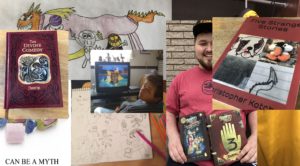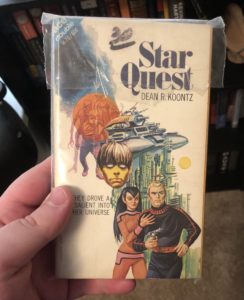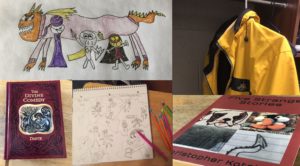Welcome to the cKotch.Com blog. I’m Christopher Kotcher, and this is Kotcher’s Pen. Time to delve into my writing’s inner workings.

Focusing In
Writers tend to be known for doing one thing well.
Dean Koontz writes thrillers. Stephen King writes horror. Timothy Zahn writes the best Stars Wars books. (James Luceno and Claudia Gray are good too.)
Each of these writers holds their own corner of the craft. Their own spheres of mastery.
Such focus can be crucial for us writers. We build particular skillsets and find homes among their strengths and weaknesses.
Focus assists readers too. Writers’ names become signals to our expectations. That’s why some writers’ names appear on a front cover larger than the book’s own title.
Around Halloween, a reader wants a good scare. She sees King’s name and knows where to go. Another reader wants something to get his blood pumping. He grabs the first Koontz book he can find.
Of course, focus isn’t something easy for all writers to find. We all get a calling to write, but the call doesn’t always include what we should write about.
Take me for example. I’m still in the middle of finding my focus.
Getting to the Personal Point
Writing’s a talent that came to me young, even before I really enjoyed reading.
My desire to write expressed itself in many forms. This included the standard stuff. Short stories, novels, comics.
My efforts also included some nontraditional projects. Biggest thing would be planning videogames.
This wasn’t anything like making fangames. I’d create stories, random sketches, cutscene descriptions, character bios, and collectables. I must have made so many Spyro the Dragon games that the amount doubles the series’ current list of games.
(For more on that interest, check here.)
As I’ve grown older, my writing kept attaching itself to more and more forms and genres. Poems, essays, blogs, science fiction, fantasy, realistic fiction.
I’ve enjoyed all of it, but I’d be lying if I said everything gets equal time. Novels would overtake blogs, which overtook poems, which overtook novels.
This would be another point in the favor of focus.
Focusing on doing one thing well prevents your interests from getting scattered in too many different directions.
Moving forward, I now always wonder if I should drop certain parts of my writing so the rest of it can grow. I’ve already felt some tension in pursuing every project I’ve wanted to pursue.
Can I master any writing if I open myself to too many forms? Would readers ever be able to attach my name to anything if my writing even include anything?
The issue’s certainly been seen in this blog. I want to include everything that inspires my writing. That’s why my plans for 2020 include grouping posts into different series.
A Process, I Suppose
All this discussion of focus is starting to remind me of a certain idea. It comes from many places. Educational theorists, philosophy, a little bit of psychology.
Essentially, life and passions begin with endless possibility. We have our own situations and talents, but we can generally work to become who we want to be.
Maturity and mastery alike require focusing on one or two different things in the wider pool of possibilities. Focus sacrifices potential futures so we can better follow our chosen futures.
This idea applies to writing too.
Take Dean Koontz for example. His first book was pure science fiction. Then thrillers became his bread and butter. He includes some science fiction in his thrillers today, but he generally doesn’t hop planets or replace universes.

I look at my writing and wonder about my path forward. I’ve already cut a few things.
Videogame ideas were fun, but I’m not looking to get into the games industry. Many of these ideas can be channeled into my mainline writing anyway.
Comics were great to draw, but written word is more my style now. Again, I can transfer these stories into written form.
I hope I don’t have to sacrifice any other writing forms in the future. Still, the possibility always remains.
No matter how much such changes may sting, I must remember it’s all part of the process. This is how I claim my own owner of the craft one day. My own sphere of mastery.
A Democratic Process, Surely
Now, how can I determine what to sacrifice in future? How can I best find my path forward as a writer?
Well, that’s partially your responsibility as a reader.
Yes, that’s right. This part involves you.
Without readers, writing is just words trapped on a page or floating in cyberspace. Readers brings words to life. Writer-reader dialogue creates something new and wonderful. Worlds are built and shaped within our minds and conversations.
Communication is key. Let me know what you enjoy. Let me know what you could do without.
Part of my growth as a writer lies in my audience. Feel free to be a vocal (yet respectful) group.
I can’t say I’ll adapt my writing or my stories according to every request. There’s a few fundamentals that need to be there no matter what.
Still, dialogue is key. In fact, this is how writers can find some wiggle room in their focuses.
Take King for example. People loved his horror writing so much he created his classic guide to writing On Writing.
Who knows the possibilities?

Discussion Time!
Here’s some extra questions to keep that writer-reader dialogue going in the comments section.
Do you notice any strengths or weaknesses in my writing? What should I focus on? Are you able to apply any of my ponderings in this post?
Kotcher’s Call to Action
If you like my content and wish to see more, you could check out my books Five Strange Stories and Good Stuff: 50 Poems from Youth on Amazon. They are enrolled in the Kindle Matchbook program, so anyone who buys the paperbacks can also get the eBooks for free.
Finally, be sure to like my Facebook page and share it with your friends. I post a link there whenever a new blog post goes live each Friday at 5:00 PM EST.
This makes me think of “Tale of the Snow Siren” from your book “Five Strange Stories”; it could have so many additional stories created from this one, whether it be her past or future. Absolutely love that story!